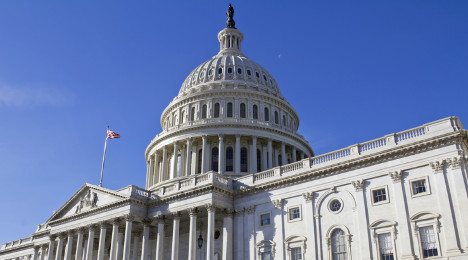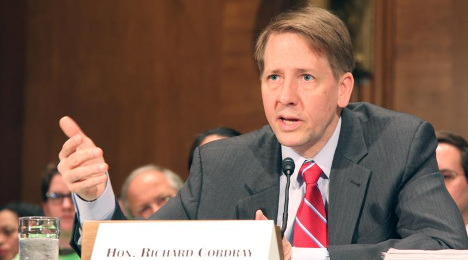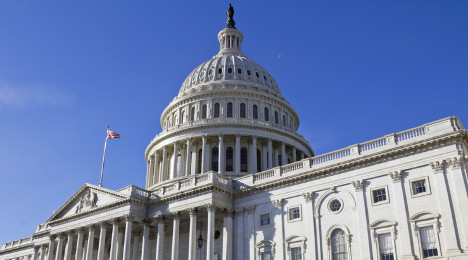Two developments on the Consumer Financial Protection Bureau front arose this week. First, the CFPB shared its monthly complaint database update. Then, another U.S. House committee took a swing a changing how the bureau operates.
For its May update, the CFPB drilled deeper into complaints that often involve both finance companies and buy-here, pay-here dealerships: credit reporting. Since the CFPB began accepting credit reporting complaints in October 2012, the bureau has handled approximately 143,700 such complaints.
Some of the findings from the bureau’s deeper analysis of this part of its complaint database included:
• Consumers complain about incorrect information on credit reports: The CFPB said more than three quarters of credit reporting complaints — 77 percent — submitted to the bureau by consumers are related to incorrect information appearing on their reports. Frequently, these complaints are about a debt collection item that has been paid but appears as an unpaid debt on the report, a debt that is not recognized by the consumer, or a debt that is no longer due because it has passed the point of being enforceable in court.
• Consumers report difficulty disputing inaccuracies: The bureau noted consumers consistently report difficulties disputing inaccuracies on their credit report. Consumers complained about experiencing long delays trying to speak to a representative at the consumer reporting company that created the report or the company that furnished the information. Other consumers complained of negative customer service experiences when they were able to get through to a representative.
• High-volume complaint companies: Out of all credit reporting complaints submitted to the bureau between December 2015 and February 2016, officials indicated 95 percent involved the three nationwide credit reporting companies — Equifax, Experian and TransUnion. Some of these complaints are related to information companies furnished to the credit reporting companies.
• Specialty consumer reporting companies: In addition to complaints against the three nationwide credit reporting companies, the CFPB determined consumers have submitted more than 2,000 complaints regarding specialty consumer reporting companies. These companies specialize in providing reports in areas including background and employment screening, checking account screening, rental screening and insurance screening.
“Credit reports are the foundation of consumers’ financial lives,” CFPB director Richard Cordray said. “Consumers continue to express their frustration about inaccurate information on their credit reports and difficulty in getting these errors fixed.
“We will continue to work to ensure that credit report disputes are investigated, errors are fixed, and consumers are treated fairly,” Cordray continued.
National CFPB complaint overview
As of May 1, 2016, the CFPB said it has handled 882,800 complaints nationally. Some noteworthy trends from the latest data included:
• Complaint volume: For April, the most-complained-about financial product or service was debt collection. Of the 23,870 complaints handled in April, approximately 7,330 of them were about debt collection. The second most-complained-about consumer product was credit reporting, which accounted for approximately 4,587 complaints. The third most-complained-about financial product or service was mortgages, accounting for approximately 4,347 complaints. These three products accounted for about 68 percent of complaints submitted in April.
• Product trends: In a year-to-year comparison examining the three-month time period of February to April vs. the same time period 12 months before, the CFPB noted student loan complaints showed the greatest increase — 48 percent — of any product or service. The bureau received 669 student loan complaints between February and April of last year, while it received 992 complaints during the same time period this year.
• State information: New Mexico, Minnesota and Indiana experienced the greatest year-to-year complaint volume increases from the February to April 2016 period versus the same time period 12 months before, with New Mexico up 41 percent, Minnesota up 33 percent, and Indiana up 26 percent.
• Most-complained-about companies: The top three companies that received the most complaints from December 2015 through February 2016 were credit reporting companies Equifax, Experian and TransUnion.
Latest House action
The House Appropriations Committee released the fiscal year 2017 Financial Services and General Government Appropriations bill, which provides annual funding for the Treasury Department, the Judiciary, the Small Business Administration, the Securities and Exchange Commission, and other related agencies.
The bill includes a provision to increase oversight over the CFPB by bringing funding for the agency under the annual congressional appropriations process, instead of direct funding from the Federal Reserve. Lawmakers explained this change would allow for increased accountability and transparency of the agency’s activities and use of tax dollars.
The legislation also would change the leadership structure of the CFPB from a single director to a five-member commission, and requires the CFPB to study the use of pre-dispute arbitration prior to issuing regulations.
One U.S. House Financial Services Committee member who possesses four decades of experience in the automotive space this week tried to pin down an outspoken advocate of the Consumer Financial Protection Bureau’s proposal that would prohibit mandatory arbitration clauses, alluding to the potential that modified policies might do more for plaintiff lawyers than consumers’ possible financial reward.
Paul Bland Jr. is executive director of Public Justice, which according to its website “pursues high impact lawsuits to combat social and economic injustice, protect the Earth’s sustainability and challenge predatory corporate conduct and government abuses.” Bland also appeared during the CFPB’s field hearing in Albuquerque, N.M., on the day the bureau released its proposal earlier this month. Bland again championed the proposal when the House’s Subcommittee on Financial Institutions and Consumer Credit conducted a hearing titled, “Examining the CFPB’s Proposed Rulemaking on Arbitration: Is it in the Public Interest and for the Protection of Consumers?”
Throughout the hearing, Bland reiterated much of what he stated during the CFPB’s event, indicating that arbitration that entities such as auto finance companies and dealerships have used for years is not good for consumers.
“The Consumer Financial Protection Bureau’s proposed rulemaking on arbitration is unquestionably in the public interest and will serve to protect consumers,” Bland said in his prepared testimony. “Specifically, it will protect consumers from the use of forced arbitration clauses that ban them from filing or participating in class actions, a widespread practice that large banks, payday lenders and various sorts of predatory lenders have used to exempt themselves from most private enforcement of America’s consumer protection laws.
“Exempting the financial industry from the normal legal system has had far reaching — and disastrous — consequences,” he continued. “Predatory lending and dishonest lending practices have pushed millions of people right into desperation. Far too many Americans have been tricked into taking out loans that were far more expensive than they realized.”
More than an hour into the hearing that teeter-tottered between industry representatives from the Consumer Bankers Association and the U.S. Chamber of Commerce defending arbitration benefits and Bland maintaining the consumer advocate view, Rep. Roger Williams took his turn to speak. Williams, a Texas Republican who has been a House lawmaker since 2012 and is chairman of Roger Williams Chrysler Dodge Jeep Ram in Weatherford, immediately aimed his questions at Bland.
“Mr. Bland,” Williams began, “I’m one of your favorite people. I’m a car dealer; have been for 44 years. I can tell you that arbitration works a lot better than lawsuits.”
Williams and Bland then traded figures about how the class actions examined by the CFPB delivered benefits to 13 million Americans. Bland contended that attorneys gained about 15 percent of the settlements for their fees. Williams asserted it could have been closer to 30 percent of the $425 million noted in the bureau’s study.
Williams then asked, “In other words, when does a lawsuit to you become worth your while?”
Bland responded, “I do a ton of work on a pro bono basis. Probably 80 percent of the work my firm does has no expectation of receiving a fee whatsoever.”
Then Williams turned to another witness who participated in Wednesday’s hearing, Andrew Pincus, a partner at Mayer Brown who spoke on behalf of the U.S. Chamber of Commerce.
“A couple of points: I think when you’re looking at class actions, it’s important to look at the costs and the benefits,” Pincus said. “And it’s important not to assume, as some of this discussion has, that every class action that’s filed is meritorious. If every class action that’s filed were meritorious, we probably wouldn’t have a problem. But the problem is we know from the studies that 87 percent of them didn’t provide any benefit to the class. The other 13 percent were settled so we don’t know if they were just settled for litigation value and maybe they, too, could have been fought if the company wanted to spend a lot of money in legal fees.
“We really don’t know if the class action system is vindicating rights that have been wronged as opposed to being a system that’s been very good for lawyers who bring cases and, to be frank, very good for the lawyers who defend them. But that doesn’t really so much for people except for transferring money around. I think that’s the major problem,” Pincus continued.
Earlier in the hearing, Rep. Blaine Luetkemeyer, a Missouri Republican who has questioned the CFPB’s motives in the past, asked Jason Johnston to attempt to quantify the amount of risk finance companies might face in association with class-action lawsuits. Johnston is a Henry L. and Grace Doherty Charitable Foundation Professor of Law at the University of Virginia School of Law and emphasized at the start of Wednesday’s session that he was not representing any organization.
“Certainly there is risk in large class actions,” Johnston said. “Under the Telephone Consumer Protection Act, for example, some of the largest financial institutions in the country such as Capital One and Chase have entered into very, very large class action settlements; many, many millions of dollars.
“When you add those up across the country and over time, again these are very large financial institutions, so we’re not talking about a magnitude of size that’s destabilizing, but it’s got to fit into the risk profile somehow,” he added.
Dong Hong, CBA’s vice president and regulatory counsel, quickly followed Johnston’s assertions.
“One of the things I fear is if the proposal goes final in the way it looks like today, there’s a potential dramatic increase in potential class action lawsuit exposure,” Hong said. “If you take a look at some of the prudential regulatory guidance, one of the things they ask financial institutions to do is maintain controls and mitigate litigation exposure risk. If they see an increase in that type of risk, then institutions will have to have conversations with their respective regulator to figure out if they have to lock away more capital to prepare for that risk.”
During his prepared testimony, Hong offered six suggestions on how the CFPB should re-examine and supplement its arbitration study:
• Conduct a comparison between litigation and arbitration on the basis of accessibility, cost, fairness and efficiency
• Ascertain if consumers would benefit from becoming more informed about arbitration
• Survey consumers who have experience with litigation, class actions, and arbitration about their level of satisfaction with these dispute resolution processes
• Examine the net benefit of class actions to consumers in light of the supervisory or enforcement authorities of state and federal regulatory and enforcement agencies
• Determine if prohibiting or restricting the availability of mandatory pre-dispute arbitration provisions would effectively eliminate arbitration as an alternative dispute resolution process for the majority of consumers
• Inspect whether prohibiting or restricting the availability of mandatory pre-dispute arbitration provisions would impact the cost and availability of credit to consumers and small businesses.
“Strong and effective consumer protection and fair and responsible banking are profoundly important to our member banks,” Hong said. “CBA routinely engages with the CFPB and other regulators to promote reasonable and effective regulation that ensures consumers have the ability to choose safe and affordable products and services.
“It is our concern the CFPB’s proposal will result in increased costs of financial services and products and inhibit the ability of financial institutions to innovate and better serve their customers. In short, consumers stand to lose from the CFPB’s proposal purportedly meant to provide greater relief,” he continued.
When Williams came to the end of his allotted five minutes during the hearing, he added, “The bottom line … it’s bad for business. It’s bad for the consumer. And it’s bad for Main Street America.”
The entire hearing can be watched via the window at the top of this page.
Three large industry organizations — the American Financial Services Association, the American Bankers Association and the Consumer Bankers Association — all found similar issues with the proposed rule governing arbitration released on Thursday by the Consumer Financial Protection Bureau.
As AFSA said it anticipated, the proposed rule bans the use of class-action waivers in consumer credit agreements, which can include vehicle installment contracts.
AFSA explained in a post on its website that late last year, the CFPB released a study on arbitration. In the material, the bureau said consumers are harmed by arbitration agreements as opposed to class action lawsuits. However, AFSA insisted its careful review of the CFPB’s study demonstrated that the opposite is true — consumers are actually better served by arbitration agreements.
In 60 percent of class actions studied by the CFPB, consumers received no remuneration at all, according to AFSA’s analysis.
The association went on to mention that in the 15 percent of cases where consumers received monetary compensation in class actions, they received an average of just $32.35, after waiting an average of 24 months. In contrast, AFSA found that consumers who prevailed in arbitration agreements, on average, received $5,389.
“The real winners in class action lawsuits are plaintiff’s attorneys who divided approximately $424 million in fees,” AFSA said on its website.
“Despite a wealth of evidence suggesting that the bureau’s interpretation of its own study is flawed, today’s rule, in its present form, would have a negative impact on customers by taking away a valuable tool to resolve disputes,” the association went on to say.
AFSA added that it will comment on the proposed rule and will continue its ongoing dialogue with the CFPB.
Meanwhile, ABA took a similar stance, citing some of the same trends in the CFPB’s study that AFSA mentioned, too.
“Consumers will get less and pay more if the CFPB’s proposal to sideline arbitration and promote class actions is ultimately adopted,” ABA president and chief executive officer Rob Nichols said. “Banks resolve the overwhelming majority of disputes quickly and amicably. When needed, arbitration is an efficient, fair and low-cost method of resolving disputes in a fraction of the time — and at a fraction of the cost — of expensive litigation. This helps keep costs down for all consumers.
“Despite acknowledging these clear benefits in its 2015 study, the CFPB has chosen to put the future of arbitration at risk by requiring companies to face a flood of attorney-driven class action suits from which consumers receive virtually nothing,” Nichols continued. “We hope the CFPB will use the public comment period to rethink its approach to regulating arbitration in a way that puts consumers — not class action lawyers — first.”
Furthermore, CBA president and CEO Richard Hunt offered his theory on the motives behind what the CFPB proposed this week.
“Arbitration has long provided a faster, better, and more cost-effective means of addressing consumer disputes than litigation or class action lawsuits. The real winners of today’s proposal are trial attorneys, not consumers,” Hunt said. “The CFPB’s own study shows consumers are better served by arbitration, noting that 60 percent of class action lawsuits provide consumers with no benefit.
"Per the bureau’s study, a consumer recovers on average $5,389 when using arbitration and just $32.35 when participating in a class action suit," he continued. "One reason for this great disparity is because class action attorneys take on average 21 percent from their clients’ cash recoveries, some take as much as 63 percent.
“It is unfortunate this pre-baked proposal is political rather than substantive,” Hunt added. “Given arbitration’s benefits for consumers and banks alike, CBA will continue its efforts to ensure a final rule does not end up eliminating this alternative dispute resolution process.”
The auto finance industry has new terminology for what the Consumer Financial Protection Bureau refers to as arbitration — "contract gotchas."
Ahead of a field hearing scheduled for later today in Albuquerque, N.M., the CFPB early on Thursday released its proposed rules that would prohibit mandatory arbitration clauses that the bureau said denies groups of consumers “their day in court.”
The bureau insisted many consumer financial products such as vehicle installment contracts, credit cards and bank accounts have “contract gotchas” that generally prevent consumers from joining together to sue their bank or financial company for wrongdoing. The CFPB believes these widely used clauses leave consumers with no choice but to seek relief on their own — usually over small amounts.
“With this “contract gotcha,” the CFPB contends that finance companies can “sidestep” the legal system, “avoid accountability” and continue to pursue profitable practices that may violate the law and “harm” countless consumers.
The CFPB stressed that its proposal is designed to protect consumers’ right to pursue justice and relief, and deter companies from violating the law.
“Signing up for a credit card or opening a bank account can often mean signing away your right to take the company to court if things go wrong,” CFPB director Richard Cordray said.
“Many banks and financial companies avoid accountability by putting arbitration clauses in their contracts that block groups of their customers from suing them,” continued Cordray, who is expected to speak at today’s field hearing. “Our proposal seeks comment on whether to ban this contract gotcha that effectively denies groups of consumers the right to seek justice and relief for wrongdoing.”
The bureau explained that mandatory arbitration clauses typically state that either the company or the consumer can require that disputes between them be resolved by privately appointed individuals (arbitrators) except for cases brought in small claims court. Where these clauses exist, either side can generally block lawsuits from proceeding in court.
These clauses also typically bar consumers from bringing group claims through the arbitration process. “As a result, no matter how many consumers are injured by the same conduct, consumers must proceed to resolve their claims individually against the company,” officials said.
The CFPB is seeking comment on a proposal to prohibit companies from putting mandatory arbitration clauses in new contracts that prevent class action lawsuits.
“The proposal would open up the legal system to consumers so they could file a class action or join a class action when someone else files it,” the bureau said.
Under the proposal, officials explained finance companies would still be able to include arbitration clauses in their contracts. However, for contracts subject to the proposal, the clauses would have to say explicitly that they cannot be used to stop consumers from being part of a class action in court. The proposal would provide the specific language that companies must use.
The proposal would also require companies with arbitration clauses to submit to the CFPB claims, awards, and certain related materials that are filed in arbitration cases. This would allow the Bureau to monitor consumer finance arbitrations to ensure that the arbitration process is fair for consumers. The bureau is also considering publishing information it would collect in some form so the public can monitor the arbitration process as well.
Through the Dodd-Frank Wall Street Reform and Consumer Protection Act, Congress required the CFPB to study the use of mandatory arbitration clauses in consumer financial markets. Congress also gave the bureau the power to issue regulations that are in the public interest, for the protection of consumers, and consistent with the study.
Released last March, the CFPB’s study showed that very few consumers ever bring — or think about bringing — individual actions against their financial service providers either in court or in arbitration. The study found that class actions provide a more effective means for consumers to challenge problematic practices by these companies.
According to the study, class actions succeed in bringing “hundreds of millions of dollars” in relief to millions of consumers each year and cause companies to alter their “legally questionable conduct.”
The bureau said its study showed that at least 160 million class members were eligible for relief over the five-year period studied. Those settlements totaled $2.7 billion in cash, in-kind relief, and attorney’s fees and expenses.
In addition, officials pointed out these figures do not include the potential value to consumers of class action settlements requiring companies to change their behavior.
“However, where mandatory arbitration clauses are in place, companies are able to use those clauses to block class actions,” the CFPB said.
Officials contend benefits to the CFPB proposal would include:
• A day in court for consumers: The proposed rules would allow groups of consumers to obtain relief when companies “skirt the law.” The bureau insisted most consumers do not even realize when their rights have been violated. Officials think that often the harm may be too small to make it practical for a single consumer to pursue an individual dispute, even when the cumulative harm to all affected consumers is significant. The CFPB study found that only around 2 percent of consumers with credit cards who were surveyed would consult an attorney or otherwise pursue legal action as a means of resolving a small-dollar dispute. “With class action lawsuits, consumers have opportunities to obtain relief from the legal system that, in practice, they otherwise would not receive,” the CFPB said.
• Deterrent effect: The bureau noted the proposed rules would incentivize companies to comply with the law to avoid group lawsuits. “Arbitration clauses enable companies to avoid being held accountable for their conduct. When companies know they can be called to account for their misconduct, they are less likely to engage in unlawful practices that can harm consumers,” officials said. Further, the CFPB projects that public attention on the practices of one company can affect or influence their business practices and the business practices of other companies more broadly.
• Increased transparency: The CFPB asserted that the proposed rules would make the individual arbitration process more transparent by requiring companies that use arbitration clauses to submit any claims filed and awards issued in arbitration to the CFPB. The bureau would also collect correspondence from arbitration administrators regarding a company’s non-payment of arbitration fees and its failure to adhere to the arbitration forum’s standards of conduct. “The collection of these materials would enable the CFPB to better understand and monitor arbitration,” officials said. “It would also provide insight into whether companies are abusing arbitration or whether the process itself is fair.”
The complete proposal is available online here.
Along with offering more details about complaints originating in California, the Consumer Financial Protection Bureau released its latest monthly consumer complaint snapshot this week as the overall total continued to march toward 900,000.
As of April 1, the CFPB said it has handled approximately 859,900 complaints across all products. The bureau mentioned four other trends from its latest complaint data update, including:
• Complaint volume: For the month of March, consumers submitted 8,243 debt collection complaints to the bureau. That figure accounted for more than 30 percent of all complaints submitted to the CFPB during the month.
• Product trends: Complaints submitted relating to credit reporting rose 35 percent between February and March. During the month of March, there were 3,321 credit reporting complaints submitted to the CFPB.
• State information: In terms of total complaints per 100,000 people, the District of Columbia, Maryland, Delaware, and Florida had the highest concentration of complaints submitted.
• Most-complained-about companies: The top three companies about which the CFPB received the most complaints between November 2015 and January 2016 were Equifax, Experian, and TransUnion.
“Today’s report shows that consumers are still running into too many dead ends and obstacles in resolving issues with their mortgage servicer,” CFPB director Richard Cordray said. “The bureau will continue to press to make sure that people can get the right information and the timely help they need.”
More details about California
The CFPB highlighted California for the monthly geographic spotlight.
As of April 1, the bureau determined consumers in California have submitted about 118,900 of the 859,900 complaints the CFPB has handled. Complaints from the two largest metro areas in California — Los Angeles and San Francisco — accounted for nearly 50 percent of the complaints submitted from the state.
Findings from the California complaints include:
• Mortgages are the most-complained-about product: The bureau found that consumer complaints from California were more likely to be about mortgages than consumer complaints nationally. While mortgage complaints account for 26 percent of all complaints submitted to the Bureau nationally, they accounted for 32 percent of complaints submitted from consumers in California.
• California debt collection complaints are lower than the national average: CFPB officials pointed out Consumer complaints from California were less likely to be about debt collection — 24 percent of total complaints submitted — than consumer complaints nationally — 26 percent of total complaints submitted nationally.
• Most-complained-about companies: The bureau mentioned Bank of America, Wells Fargo, and Experian were the three most-complained-about companies from consumers in California.
The Consumer Financial Protection Bureau’s strategy to regulate how arbitration can occur might become clearer since the agency now has scheduled a field hearing specifically about the topic.
On Wednesday, the CFPB announced plans for a field hearing about arbitration; one of nine priority goals spelled out by the bureau’s chief of staff earlier this year. The hearing — which will feature remarks from CFPB director Richard Cordray as well as testimony from consumer groups, industry representatives and members of the public — is set for May 5 in Albuquerque, N.M.
Changing how arbitration can unfold has been on the CFPB’s radar for some time.
Last October, the bureau used the phrase “free pass” to describe how some finance companies include arbitration clauses in their vehicle installment contracts. The wording came when the CFPB announced it is considering proposing rules that would ban consumer financial companies from using a “free pass” to block consumers from suing in groups to obtain relief.
At various times, Cordray discussed his sentiment about arbitration. Once instance came earlier this year when he spoke during an event hosted by the American Constitution Society. Cordray declared “arbitration clauses, as they are used today both in the field of consumer finance and more generally, often have been deliberately designed to block Americans from effective means of vindicating their rights.”
And in his opening testimony when appearing at hearings conducted in both chambers on Capitol Hill, Cordray reiterated the general mandate of the CFPB, which could include in how it oversee arbitration.
“In addition to implementing the Dodd-Frank Act, the bureau continues to explore other areas where regulations may be needed to ensure that markets function properly and possibly harmful or inefficient practices are addressed,” Cordray said.
“Over the next six months, the bureau will continue implementing the Dodd-Frank Act and using its regulatory authority to ensure that consumers have access to consumer financial markets that are fair, transparent, and competitive,” he went on to say.
A vivid partisan divide appeared again this week when the U.S. House Financial Services Committee approved a measure that would place budget appropriations for the Consumer Financial Protection Bureau within Congressional jurisdiction.
The committee approved what is being called the Taking Account of Bureaucrats’ Spending Act by a vote of 33-20 with the entire opposition tally coming from Democrats.
A committee news release explained the measure sponsored by Rep. Andy Barr, a Kentucky Republican, would make the CFPB “accountable to taxpayers” and would ensure “effective” oversight by Congress.
Lawmakers in favor of the legislation contend drafters of Dodd-Frank Act “purposely” made the bureau exempt from oversight and the normal checks and balances of the budget and appropriations process. As a result, House Financial Services Committee chairman Jeb Hensarling insisted CFPB director Richard Cordray can spend hundreds of millions of dollars each year with no oversight or control from Congress, the president or any executive branch agency or official.
“Every government agency should be accountable to the elected representatives of ‘We the People’ and the CFPB should not be an exception to that rule,” said Hensarling, a Republican from Texas who is scheduled to give remarks on the closing day of the 20th annual Non-Prime Auto Finance Conference orchestrated by the National Automotive Finance Association.
“We have the Pentagon which is on budget. We have the Justice Department which is on budget. There is certainly no greater duty we have than to provide for the common defense, and we do not let the Pentagon write its own budget,” he continued. “We should not let the CFPB write its own budget. It is a base matter of congressional oversight and of Article I authority.”
The measure approved by the committee authorizes $485.1 million for the CFPB; the same amount Cordray determined was necessary to fund the bureau during the most recent fiscal year.
According to a news release posted by the committee’s minority members, the measure wouldn’t generate the benefits Republicans claim.
“The majority claims this will save nearly $6 billion over the next 10 years, which can only be true if Congress ceased all funding for the CFPB. Committee Democrats defended the Bureau — which Republicans have tried to dismantle since it was created – and the need to shield it from the political whims of the Congress,” the lawmaker said.
Barring a last-minute change because of commitments on Capitol Hill, Hensarling will give attendees at the NAF Association’s annual gathering the opportunity to hear first-hand how the House is handling the CFPB and other matters associated with auto financing. The Non-Prime Auto Finance Conference runs from June 1 to June 3 at the Marriott Legacy Town Center in Plano, Texas.
Before Hensarling appears to begin the final day of the event, the NAF Association lined up a series of experts to present the latest trends and analysis. The conference will open with the presentation of the Non-Prime Auto Financing Survey, which again this year is a collaboration involving the NAF Association, the American Financial Services Association as well as Dwayne Furmidge of Benchmark Consulting International.
For the complete agenda and registration details, go to this website.
The sparring between lawmakers and the Consumer Financial Protection Bureau’s Richard Cordray continued on Thursday when the director offered his semiannual report to the U.S. Senate Banking Committee.
What has been a source of much consternation percolating from the upper chamber’s counterparts in the U.S. House germinated during the second of two Senate committee hearings this week that focused on the CFPB and its work, especially in auto finance.
As first mentioned by the American Financial Services Association through its weekly Newsbriefs, an edgy exchange between Cordray and Sen. Tom Cotton began when the Arkansas Republican received his turn to question the bureau’s boss more than an hour into Thursday’s hearing. Cotton focused his attention on the CFPB’s 2013 settlement of fair lending claims against Ally Financial; an action that’s been questioned in multiple reports by the House Financial Service Committee.
Cotton referenced an online tool available from the Wall Street Journal aimed at mimicking, to a degree, the statistical likelihood formula the CFPB uses to determine the ethnicity of individuals who might be impacted by discrimination by Ally or any other auto finance provider that falls under the CFPB’s jurisdiction — better known as larger participants that originate more than 10,000 vehicle installment contracts and leases per year.
The Arkansas lawmaker said he used the information he gathered about Sen. Richard Shelby — an Alabama Republican and committee chairman — and Sen. Sherrod Brown — an Ohio Democrat and ranking member. Cotton indicated that the tool that leverages surnames and ZIP codes projected that there was an 89 percent likelihood Brown was a member of a protected class and a 70 percent chance Shelby was, too. Cotton added that the tool suspected at a rate of 88 percent that he, too, was a member of a protected class.
For the record, Brown, Shelby and Cotton are all white males.
Cotton peppered Cordray with a series of yes-or-no oriented questions aimed at confirming how the CFPB determined the amount of consumers harmed by Ally’s practices and how these borrowers would be able to secure restitution from the pool of $80 million included in Ally’s settlement with the bureau.
When confronted with the results of Cotton’s experiment and asked to explain how the process unfolds, Cordray said, “In each of those examples, they would have had to affirmatively opt-in. They would have to respond and state that they were a minority borrower.
“I assume that each of you would not do that otherwise you’re committing fraud,” Cordray continued while pointing to each of the lawmakers.
“They were charged a higher rate based on a pattern of practices that systematically showed minorities in certain categories paid higher rates,” he added.
Cotton and Cordray then began talking over each other before the CFPB director’s voice rose enough that the lawmaker paused.
Cordray asked, “What do you do for those 325,000 consumers? Do you set up a system that’s difficult for them to comply with and get their money? Or do you set up a system that’s reasonable to comply with and get their money?
“If there turns out to be a systematically large number of people who fraudulently got checks under the settlement that’s something we’ll take very close account of and consider responding to,” Cordray continued. “But 325,000 people did qualify for appropriate redress here. I haven’t seen the large number of fraud cases. It’s all been hypothetical and people have an apprehension.”
Cotton finally interjected, “But your model is hypothetical.”
Cordray replied, “But there’s nothing hypothetical about 325,000 consumers who were systemically discriminated against.”
Cotton then wondered if the CFPB’s form to impacted Ally contract holders included provisions to prevent fraud such as confirmation of ethnicity would be subject to perjury charges if proven to be false.
Cotton asked, “Did the Department of Justice recommend that you had to opt-in under penalty?’
“We worked with the Justice Department,” Cordray replied
“This is routinely required on federal forms,” Cotton retorted.
“We’re not doing something different than the Department of Justice in this case. We’re working together. We’re on the same page,” Cordray said.
Cotton then questioned, “Did you personally decline the Department of Justice’s recommendation that a penalty of perjury would be attached to such a statement?”
Cordray retorted, “I don’t believe I did. I’d be happy to have my staff follow up with you.” That CFPB staff totaled 1,486 members as of Sept. 30, according to Cordray’s opening testimony.
As Cotton’s allotted time expired, Cordray reiterated, “I stand by and believe this was a reasonable approach to how to get relief to hundreds of thousands of consumers who were discriminated against under the disparate impact theory that I know some people disagree with but the Supreme Court has reaffirmed it is the law of the land.
Before yielding back to Shelby, the committee chairman, Cotton said, “Well 330 members of the House of Representatives, including many members of the Congressional Black Caucus, disagree.”
The entire Senate hearing featuring Cordray can be viewed here.
In advance of Richard Cordray’s semiannual appearance before the U.S. Senate Banking Committee, lawmakers from Congress’ upper chamber conducted a hearing on Tuesday dubbed “Assessing the Effects of Consumer Finance Regulations,” where the primary topic was Consumer Financial Protection Bureau impact.
While the CFPB’s director returns to Capitol Hill on Thursday, the Senate committee spent more than two hours hearing from a trio of witnesses who all questioned the negative consequences the bureau is leaving, including on auto financing. After Sen. Richard Shelby — an Alabama Republican and committee chairman — and Sen. Sherrod Brown — an Ohio Democrat and ranking member — gave their opening remarks, the session moved on to the experts brought to share their perspectives, which included Leonard Chanin. After spending 20 years at the Federal Reserve, Chanin now is of counsel in the financial services practice group at Morrison & Foerster in Washington, D.C.
In Chanin’s opening remarks, he discussed how financial institutions are behaving differently now that the CFPB is wielding its regulatory powers.
“While it is difficult to quantify the precise impact that CFPB rules, guidance, enforcement orders and other actions, as well as activities by other federal banking agencies, have had on consumers and the broader market for financial products and services, it seems clear that such rules and other actions have had a significant adverse impact on the ability and willingness of institutions to offer those products and services,” Chanin said
“Anecdotal and other evidence clearly indicates that institutions have reduced the products and services offered to consumers and some institutions have been reluctant to offer new products and services,” he continued in his early testimony.
Another witness who questioned the positives the CFPB brings to the financing environment was Todd Zywicki, who is professor of law at the Antonin Scalia School of Law at George Mason University and executive director for law and economics at the university’s Mercatus Center. Initially, Zywicki defended the CFPB’s origins having spent part of his professional career as the director of the Federal Trade Commission’s Office of Policy Planning.
“Let me stress at the outset that at the time of Dodd-Frank, I supported the need to unify consumer financial protection policy under a single agency,” Zywicki said. “Based on my long study of consumer finance and its regulation as well as my hands-on experience … I believe that the regulatory framework that existed prior to Dodd-Frank was too fragmented and too cumbersome to effectively regulate the full range of consumer financial protection products at the federal level.”
But how the CFPB has gone about its business left Zywicki with a different assessment.
“The tragedy of Dodd-Frank and the CFPB is that it squandered this unprecedented opportunity to modernize the consumer credit system to promote competition, consumer choice, and innovation. Instead, the post-crisis regulatory framework has resulted in higher prices and reduced choice for consumers and little improvement in consumer financial protection,” he said during his opening testimony.
“Indeed, by stifling competition and driving millions of Americans out of the mainstream financial system, it may actually result in more consumer protection problems,” Zywicki went on to say.
Also sharing more than 20 pages of opening testimony in an attempt to poke holes in the CFPB’s effectiveness was David Hirschmann, who is president and chief executive officer of the Center for Capital Markets Competitiveness at the U.S. Chamber of Commerce.
Like Zywicki, Hirschmann also praised some of the objectives the CFPB outlines as priorities.
“The Chamber strongly supports sound consumer protection regulation that deters and punishes financial fraud and predation and ensures that consumers receive clear, concise, and accurate disclosures about financial products,” Hirschmann said. “Everyone — businesses as well as consumers — benefits from a marketplace free of fraud and other deceptive and exploitative practices.
“We have welcomed efforts by the bureau that advance this important goal,” he continued.
Then Hirschmann went into scores of details about how the CFPB is negatively impacting financial flow and opportunity in the market. In order for the CFPB to carry out its goal of making products and services ““fair, transparent, and competitive, Hirschmann offered five recommendations to the bureau, including:
—Provide clear rules of the road for financial services companies so they can compete on a level playing field
—Use enforcement actions to deter fraud and predation, not to announce new, broadly applicable regulatory policies
—Strengthen the bureau’s own accountability by enhancing transparency and committing itself to fair administrative processes
—Limit regulatory duplication and conflict by coordinating with other agencies
—Preserve companies’ use of diverse tools, like arbitration agreements, to manage their relationships with the customers they serve
Of the four witnesses gathered for the hearing, the individual who defended the CFPB’s action most fervently was Rev. Willie Gable Jr., who is pastor of Progressive Baptist Church in New Orleans and chair of the Housing and Economic Development Commission of the National Baptist Convention USA. The commission’s mission is to develop affordable housing for low and moderate-income persons, particularly for senior citizens and the disabled.
While Gable discussed housing, he also made special mention of the auto finance space while articulating what he sees as problems in acquiring a vehicle by individuals with soft credit histories or lower income levels.
“After one’s home, the largest purchase many will make is their car. Here, too, predatory practices abound. Car dealer interest rate mark-ups, much like yield-spread premiums in the mortgage market, make car loans more expensive for many consumers. This is also a practice with a long history of discriminatory impact on borrowers of color,” Gable said.
“Abuses are in this industry have escaped attention until recently. But CFPB has taken important action in this area, including providing guidelines aimed at preventing discriminatory practices and taking much-needed enforcement actions. As a result, the Bureau has come under fire from members of Congress. This fire is misplaced,” he continued.
“Instead, the focus should be directed at why, for more than two decades, auto lenders’ and dealers’ practices have operated under a cloud of discrimination and abuse of low-income borrowers. Rather than defending a system that continues to fail many of our communities, Congress should push for a more transparent, fair system of auto finance,” Gable went on to say.
Perhaps an example of what Gable referenced came at the start of this hearing when Shelby criticized the CFPB’s handling of auto finance, making the connection of how the bureau might be indirectly regulating dealerships not under its jurisdiction by bringing actions against indirect finance companies.
“Instead of setting clear rules, the bureau is using enforcement actions to reshape the auto finance industry,” Shelby said. “As demonstrated by settlements with the bureau, its goal has been to limit the interest rate that dealerships charge based on factors other than financial risk.
“What’s more, these limits often differ leading to an uneven playing field not only among companies that have settled, but also between them and the rest of the market,” he continued. “I fear that this has set a dangerous precedent for the role of a regulator in our financial markets.”
Brown mentioned what he is fearing too, referencing consumer debt not including mortgages has topped $3.5 trillion with about a third of that amount being in auto finance.
“It is our duty in Congress to resist collective amnesia and ensure that the same bad practices that led to the crisis are not repeated by a new set of players,” Brown said. “This is why I continue to be troubled by Republican efforts to undermine, and even eliminate, the CFPB.”
Opening testimony from each of the four witnesses as well as a video recording of Tuesday’s hearing can be viewed here.
FactorTrust recently added a former top official at the Consumer Financial Protection Bureau to its board of directors
Lending her expertise to the organization’s audit and risk committee is industry veteran Marla Blow, who now is founder and chief executive officer of FS Card, a Washington D.C.-based credit card venture designed to offer underserved borrowers flexible, convenient and reasonably priced mainstream credit card products.
Blow previously served as assistant director at the CFPB where she was responsible for policy related to the credit card, prepaid card and payments industries. During her tenure at CFPB, Blow served as a lead author of the federal government’s most comprehensive analysis of the consumer credit card market to date.
Blow’s experience also includes seven years at Capital One, including senior roles in risk management, marketing, finance and business development.
Blow is a Henry Crown Fellow at the Aspen Institute in 2015 and is a member of the Aspen Global Leadership Network. She holds an MBA from Stanford University Graduate School of Business, and a bachelor’s degree from The Wharton School at the University of Pennsylvania.
“We are delighted that Marla has joined our team. Her private sector experience and industry acumen, coupled with her CFPB tenure, will prove to be a huge asset to FactorTrust as we continue to grow, expand our offerings and strategically navigate the changing landscape of our industry,” FactorTrust CEO Greg Rable said.
Blow added, “I’ve been impressed with FactorTrust’s commitment to creating solutions for the underserved market. The alternative lending market is more relevant today than perhaps ever before.
“It’s critically important to offer options to consumers who have shown the ability to be financially resilient in tough times,” she continued. “FactorTrust’s unique credit data and predictive analytics give deserving consumers more options, ultimately empowering millions of Americans and getting them the credit that they deserve and need. I am proud and excited to join their team.”












